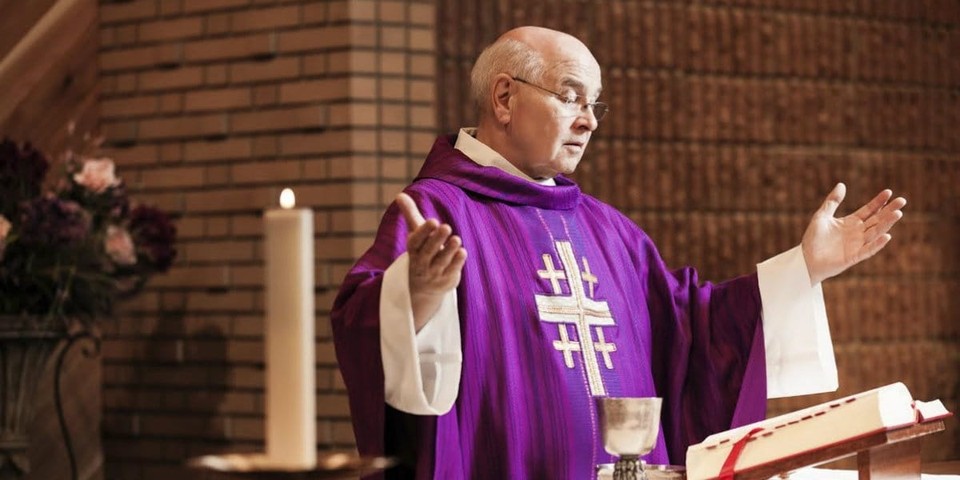Why Preaching the Word of God is Both a Burden and a Fear

“…rightly dividing the Word of truth” (2 Timothy 2:15).
The other day I posted this on Facebook…
Ever wonder how pastors deal with Sunday morning anxiety? They’re about to enter the pulpit and lead a congregation to worship the living God, then open His book and declare its life-changing message. What a responsibility! How do they cope with so great a burden? I’ll tell you how. They breathe deeply, commit it all to the Lord, and keep telling themselves, ‘Relax, hotshot. This is not about you.‘ — Most have to say it about 150 times before the message gets through. For some, 600 repeititons are required. And alas, some never get the message and approach this most solemn of responsibilities thinking it’s all about them.
That generated some response. And one in particular that resonated with me.
Longtime friend Frank Hansen, whom I wed to his wife Sheryl half a lifetime ago, expressed concern for those who cope with “the burden and fear of handling the word of God.”
Frank gets it. It is precisely that: handling the Word of God is both a burden and a fear.
Standing before groups large and small or even individuals and opening God’s Word is a privilege, an opportunity, a responsibility, and a lot of other things. But it’s also a burden and a fear.
We must never take this lightly. Lives hang in the balance.
The burden of the Lord.
Old Testament prophets sometimes began their assignment by announcing “The burden of the Lord” (e.g., Nahum 1:1). Any pastor who claims not to feel the burden from time to time has been playing at the business of preaching. Well, either that, or delivering someone else’s sermons.
Lives hang in the balance. People who hear the Word and believe may live forever. Those who reject Christ will have eternity to regret their decision. And the determining factor sometimes can be the way one declared the “whole counsel of God.”
No wonder some preachers think this is about them, since so much is at risk here. If I do it well, God uses it to change lives forever. And if I do it poorly or get in the way, those who reject my ineffective message will more than likely reject my Savior too.
The burden is enormous.
Hebrews 13:17 reminds the church that ministers will someday stand before the Lord and give account for their souls. “Let them do this with joy and not with grief,” the inspired writer says, “for that would not be profitable to you.”
Yikes. I’m going to account to the Lord for the people hearing me today? How awesome–and frightening is that!
The fear of the Lord.
“It is a fearful thing to fall into the hands of the living God” (Hebrews 10:31). While I expect this warning applies to the sinful and rebellious, anyone with an inkling of an awareness of the greatness of our God knows the feeling. The sense of dread is almost palpable sometimes.
I’m going to stand before the Lord and give account. Oh my.
What if I get this wrong? What if people stumble over my poor delivery and fail to see it’s all about Jesus Christ? What if someone misses Heaven because of me?
It’s easy to see why preachers sometimes feel it is indeed about themselves. Their preparation and prayer, their delivery and their connection with the congregation, these and a hundred other considerations occupy so much of their mind and fuel their concerns.
No wonder God has to call people into His service. No one would volunteer for such an assignment, knowing the weightiness of the responsibility and the certainty of the accountability .
I keep thinking of the line from the Chronicles of Narnia. Here’s the way Mark Buchanan tells the story in his book “Your God is Too Safe.”
In C. S. Lewis’ most famous Narnia chronicle, ‘The Lion, The Witch, and the Wardrobe,’ the children–Peter, Susan, Lucy, and Edmund–enter Narnia through a wardrobe in their uncle’s home. Edmund has already given allegiance to the witch and snakes off to join ranks with her. The other three children go to the home of the Beavers, a wary but hospitable pair. Mr. and Mrs. Beaver tell the children that they will take them to see the King, Aslan.
‘Is–is he a man?’ asked Lucy.
‘Aslan a man!’ said Mr. Beaver sternly. ‘Certainly not. I tell you he is the King of the wood and the son of the great Emperor-Beyond-the-Sea. Don’t you know who is the King of Beasts? Aslan is a lion–the Lion, the great Lion.’
‘Ooh,’ said Susan. ‘I thought he was a man. Is he–quite safe? I shall feel rather nervous about meeting a lion.’
‘That you will, dearie, and make no mistake, ‘said Mrs. Beaver. ‘If there’s anyone who can appear before Aslan without their knees knocking, they’re either braver than most or else just silly.’
‘Then he isn’t safe?’ said Lucy.
‘Safe?’ said Mr. Beaver, ‘don’t you hear what Mrs. Beaver tells you? Who said anything about safe? ‘Course he isn’t safe. But he’s good. He’s the king, I tell you.’
Let us approach this most sacred of duties with a full recognition that lives hang in the balance, that God is at work here, that we are dealing with what has been called “the fine china of human lives,” and that we shall give account for every idle word (as well as all the other ones!).
Humanly speaking, this is not doable.
Only in the power and strength of the Lord can any of us hope to preach the Word with integrity and authority.
Publication date: November 18, 2015
Originally published November 18, 2015.





